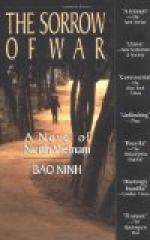|
This section contains 662 words (approx. 2 pages at 400 words per page) |

|
The Sorrow of War: A Novel of North Vietnam Summary & Study Guide Description
The Sorrow of War: A Novel of North Vietnam Summary & Study Guide includes comprehensive information and analysis to help you understand the book. This study guide contains the following sections:
This detailed literature summary also contains Topics for Discussion on The Sorrow of War: A Novel of North Vietnam by Bao Ninh.
This novel is the story of a North Vietnamese soldier, Kien, and his experiences before, during, and after the Vietnam War of the 1960's and 70's. Unstructured but never rambling, the book is an intense, vivid, and empathetic portrayal of an emotionally traumatized mind that experiences survivor guilt. The book is written in the style of a stream of consciousness with shifts of narrative tense juxtaposed with descriptions of both recent events and the distant past. The primary theme of the book involves an exploration of the suffering caused by war and the brief experiences of human contact that give hope for transcending that suffering.
The first part of the novel takes place in the past and chronicles Kien's experiences on a body collection team in the months following the end of the war. Atmospheric descriptions of the jungle are interspersed with his recollections of the more distant past, specifically his experiences of bloodshed and sacrifice in combat. These experiences are also juxtaposed with his idealized memories of his childhood friend and sweetheart, Phuong.
Eventually, though, the narrative shifts its emphasis too the post-war present, when Kien has been fully demobilized from military duty and is struggling to rebuild both his life and personal identity in Hanoi, the city where he grew up. Narration shifts back and forth between distant past, near-past and present as Kien experiences surges of memory and feeling associated with combat experiences, his relationship with Phuong, and his efforts to put his past behind him and get on with his life.
In Kien's efforts to deal with the trauma of both the war and the end of his relationship with Phuong, he becomes addicted to alcohol and to cigarettes, simultaneously finding himself intensely engaged in writing a kind of memoir. Kien becomes obsessed with recording his experiences in combat, at times staying up all night so that he can vent all his memories and feelings into a manuscript. Kien reads pages of that manuscript to an upstairs neighbor, a Mute Girl who has moved into the attic apartment once inhabited by Kien's painter father. For her part, the Mute Girl becomes obsessed with Kien, collecting the often forgotten pages of the manuscript, putting them in some sort of order, and allowing herself to be used sexually by Kien in his usually drunken moments of emotional vulnerability and sexual need. Kien eventual breaks up with Phuong, triggered by his inability to accept her prostitution-defined past and her inability to live up to his ideals and his expectations of her.
Meanwhile, as the traumas and sufferings of the present intertwine with the past, the narrative details Kien's combat experiences. These include the frequent sacrifices made by others so that he and other comrades can live, encounters with other women, including his fellow soldier Hien and the courageous guide Hoa, and the ill-fated determination of one fellow soldier Can to abandon the army and return to his quiet life on the farm with his mother. There are also glimmers of transcendent hope and humanity, specifically in an encounter between Kien and some North Vietnamese comrades and a South Vietnamese family that should have been enemies but instead proved to be generous and compassionate hosts.
As the book reaches its climax, its parallel past and present narrative lines converge. In the past, Kien witnesses Phuong being raped who then transforms, literally before his eyes, into a woman whose sexuality is her means of survival. At the same time, he makes his first personal kill of the war. In the present, Kien's memories and remorse exceed even the healing process of writing his manuscript and he disappears. In the book's final pages, the reader becomes aware of the narrator. The point of view of the story is that of Kien's neighbor who, has attempted to put the manuscript that he receives from the Mute Girl into some kind of coherent order to make it accessible and available to others.
Read more from the Study Guide
|
This section contains 662 words (approx. 2 pages at 400 words per page) |

|



